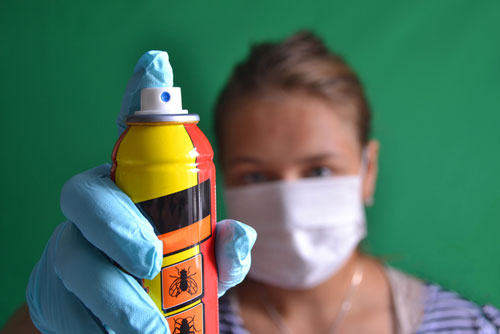Nobody wants to share their home with bugs. That’s why, when we see ants or roaches, we often reach for a can of spray.
Or maybe you have an insect control company spray your home on a regular basis to prevent bug invasions. Some people go further and have their yards sprayed as well.
New research shows that when you use the most common type of bug spray, you are not only killing the insects, you may be killing yourself as well.
The study was published in the journal JAMA Internal Medicine. Researchers followed 2,116 subjects for an average of 14 years. They tested the subjects’ urine for pyrethroids.[1]
Pyrethrin and its synthetic derivatives, pyrethroids, are the main chemicals used in insecticides. They do a good job killing bugs…but our bodies absorb them.
If you buy a can of ant or roach spray, chances are it will contain pyrethrin or pyrethroids.
The investigators found that subjects with the highest pyrethroid levels were three times more likely to die from heart disease. And they had a 56% higher rate of death from all causes.[2]
5 Natural Ways to Keep Your Home Insect-Free
You don’t have to choose between living with dangerous chemicals or an insect infestation. Here are five natural ways to keep bugs away:
- Hot pepper spray is good for vanquishing insects from your yard or garden. Mix a gallon of water with 10 hot peppers chopped finely. Or you can use three tablespoons of hot pepper flakes. Simmer in a pan for 15 minutes. Wait 24 hours, then strain the mixture. Add to a spray bottle with a few drops of dish soap.
- Borax and sugar. Borax might sound like a chemical, but it’s a natural mineral, sodium tetraborate. To stop an ant infestation, mix ½ cup of sugar, 2 tablespoons of borax and one cup of hot water. Spray wherever you see ants congregating. The sugar attracts the ants. The borax kills them.
- Diatomaceous earth is a great way to get rid of bedbugs, which are otherwise very difficult to kill. It’s a gritty white powder that is made from the fossilized remains of diatoms, a type of algae. It’s harmless for humans to touch, but when bedbugs walk on it they are sliced to ribbons. Spoon out a thin layer around your bed and along floorboards. Wear goggles and a respirator mask while you do it to avoid eye or lung irritation. This works well for fleas, too.
Diatomaceous earth is available from home improvement stores and online retailers.
- Baking soda and sugar are a good cockroach killer. Mix equal parts of the two together. Sprinkle it in areas where you think roaches may be hiding. Add a little more on a daily basis. Tempted by the sugar, roaches will eat the mixture. The baking soda will react with their stomach acid and gradually kill them.
- Vinegar and chopped up apples placed in a bottle with a shaker or funnel-shaped top makes a great trap for fruit flies. The pests get in but they won’t get out.
Chemical and pest control companies would like you to think that they have the only solution to bug problems. Do your heart a favor. When you see bugs, think twice before spraying.
Editor’s Note: Research shows the standard heart disease treatments—stents and statin drugs—don’t prevent heart attacks. Discover what does. Get the Heart Smart Protocol. It’s a simple, science-backed plan that prevents and treats America’s number-one killer naturally, without drugs or procedures. You’ll find it in our monthly journal, Independent Healing. Subscribe HERE.
Related Articles
‘Bad’ Cholesterol Does Not Cause Heart Disease
Everyone Over 50 Needs This Heart Test
Don’t Let Insomnia Wreck Your Heart
Like this Article? Forward this article here or Share on Facebook.
[1]https://www.ncbi.nlm.nih.gov/pubmed/31886824
[2]https://www.nytimes.com/2019/12/30/well/live/pyrethrin-insecticide-pesticide-heart-disease-cardiovascular-death.html

